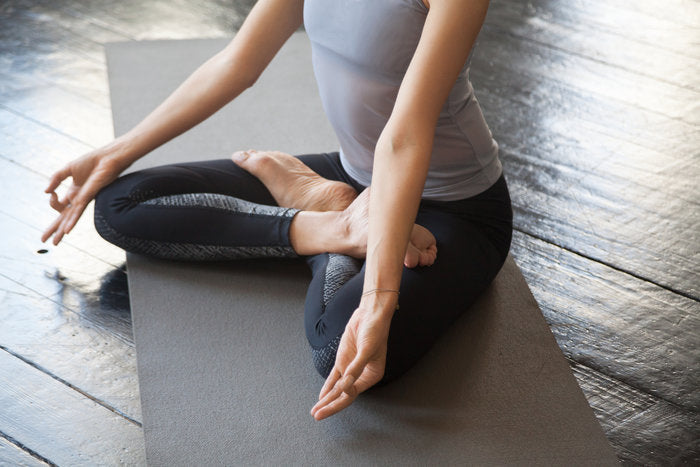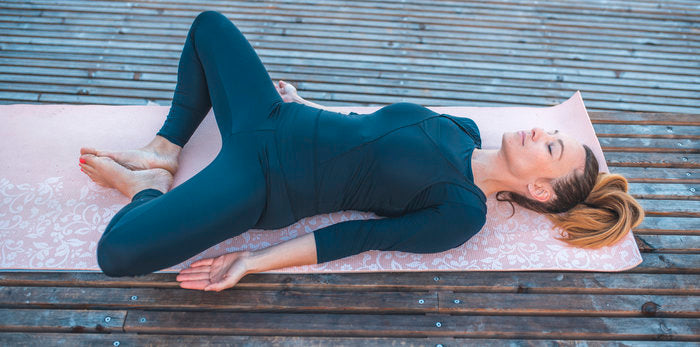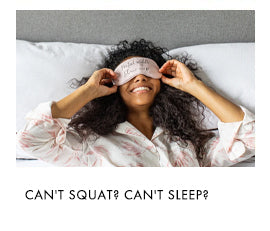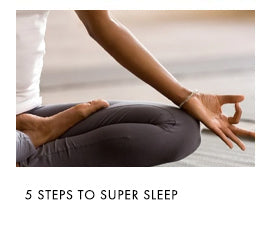5 Daily Yoga Poses For Better Sleep
Posted by Adam Meads, Apr 27, 2020

It’s no secret we absolutely love a bit of yoga here at NEOM. A true connection between mind, body and soul, yoga and the associated poses offer a wealth of wellbeing benefits – one of which is better sleep.
Yoga is a true hero when it comes to combating daily stresses. It works to relax and calm both the body and mind whilst enhancing feelings of tranquillity and harmony. This is the perfect addition to a bedtime ritual as it helps to prepare you for a perfect night’s sleep. And getting enough sleep is SO important for us all - nothing affects how you look or feel as much as sleep, or lack of it.
So, in the fight for better sleep, yoga is something seriously worth considering.
With so many yoga poses and exercises out there, we thought we’d highlight our top 5 poses that are often associated with promoting better sleep.
All these poses and movements can be done in the comfort of your home and require little space – making little opportunity for excuses!
Give them a go and see how you get on (if you have any medical concerns or injuries, remember to seek the advice of a health professional first). If you think it’s helped improve your sleep, we’d love to hear about it. Tag us on Instagram with your best pose.
Best Yoga Poses and Exercises for Sleep
Viparita Karani – Legs Up the Wall Pose
This may be a simple pose, but the effects can be powerful. Lay on your back with your legs up against a wall. For comfort, you may want to use a yoga mat if you’re doing it on a hard floor.
Try and keep your legs as straight as possible, resting the soles of your feet on the wall. Relax your body and try and hold the position for a few minutes. The more flexible you are, the higher up the wall you will be able to get. The more practise, the more progress you’ll make!
Close your eyes and focus on your breathing. Lay your arms out beside you and get zen.
Let gravity do the work for you and enter a calming haven through deep breaths and a relaxed mind.

Siddhasana - Accomplished Pose
This is arguably one of the most iconic yoga poses. It radiates calm and helps you to really focus your mind on the now – perfect for combatting busy thoughts and an overactive mind before bed!
Sit in a cross-legged position, with your back straight, head up and your ankles lined up and tucked in. Rest your hands on your knees.
You may want to alternate which leg you have crossed over the top to ensure flexibility on both legs.
This pose will get you really thinking about your breathing, encouraging deep, long breaths. It also promotes good posture, great for those of us sat at a desk all day. A straight back and good posture will also open up your chest helping to improve your breathing.

Balasana – Child’s Pose
The Child’s pose offers a fantastic stretch for the back, legs and hips, whilst helping to induce a feeling of calm and relaxation. If you’ve had a busy day, this is a great position to help reset the body and mind.
Put your hands and knees on the floor. Sit back to lower yourself down. Widen your hips to get lower (and likely providing your hips with a much-needed stretch).
With your arms stretched forward, lower yourself forwards so your face is close to touching the ground. At this point you can hold the pose and release the day’s tension.
From this pose, you can then move into other poses very naturally if you want to add more complexity to your yoga routine.

Supta Baddha Konasana – Reclining Butterfly Pose
This restorative pose helps to stretch muscles whilst creating a feeling of calm.
Sit on the floor with your legs crossed and your feet touching. Bring your heels into your pelvis. Your hips will probably already feel a welcome stretch.
Lean back to lower your back to the floor. If this is too difficult, simply roll up a mat or towel so you are elevating your resting position (and not leaning back as much).
This movement will really stretch out a whole host of muscles and allow you to focus on relaxing breathing techniques.

Uttanasana – Standing Forward Pose
The Standing Forward pose is great at stretching your hamstrings and lower back, while helping regulate calm around your body by increasing oxygen flow to your head.
Stand with your feet shoulder width apart. Bending at the hips, try and lower your upper body forwards, towards your feet. This is going to really test your flexibility in your hamstrings so go down slow and steady and don’t force it.
Keep your knees slightly bent and avoid them locking.
This movement isn’t about tensing your legs and trying to hold the position, it needs to come from a place of ultimate muscle relaxation and almost letting your upper body hang down. This will get your muscles relaxed and restored.

Get Sleep Smart with NEOM
Our Scent to Sleep range here at NEOM is your perfect partner for helping get better sleep. Packed full of the best essential oils for sleep, this range is designed to help create calm and relax your mind and body.
From sleep candles, to diffusers and body butters, these products can also be used alongside your evening yoga routine to help create a calming haven that supports better sleep.
With beautifully scented aromas filling the room, your evening yoga routine just got a serious upgrade. Breathe in the rich essential oils whilst you perform your yoga poses and win your fight for a great night’s sleep once and for all!

